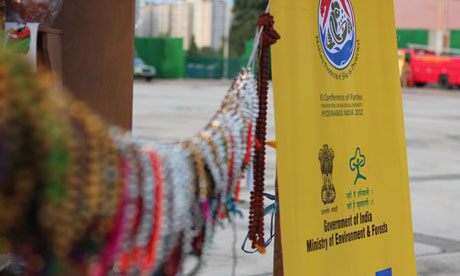Countries 'failing to act' on Nagoya biodiversity promises
Only 14 of 193 nations have acted on a landmark deal to protect endangered species and habitats, WWF warns

Hyderabad, India, is hosting the 11th annual meeting of the Conference of the Parties for the Convention on Biological Diversity. Photograph: COP11
Less than one in 10 of the countries that signed up to a landmark agreement two years ago to protect endangered species and habitatshas taken action to implement the deal, according to the conservationgroup WWF.
The warning comes as officials from more than 190 countries meet in Hyderabad on Monday for a major meeting on safeguarding nature. On the agenda is how governments fund and enact the targets agreed in Nagoya, Japan, in 2010, to halve the loss of natural habitats and increase the area of the world's land taken up by nature reserves from less than 10% currently to 17% by 2020.
Named after the region around Nagoya, the Aichi biodiversity targetsalso called for a marine protected zones to increase from 1% of the world's seas to 10% by 2020.
As the eleventh meeting of the Conference of the Parties for the Convention on Biological Diversity (CBD) got underway today, WWF said that although 91% of the CBD's 193 parties have strategies for protecting biodiversity, only 14 had taken into account the plan agreed in Nagoya.
Lasse Gustavsson, WWF International's executive director for conservation, said: "What was agreed in Nagoya really has the power to halt the dramatic loss of biodiversity across the globe and address the main drivers of the destruction. But now governments must prove that Nagoya was not just a platform for empty promises. They need to start taking real steps and implement the targets and commitments they agreed on."
The issue of how much money will be needed to fund these plans - and, crucially, how to finance them - will be at the forefront of discussions. Richard Benyon, the Department for the Environment, Food and Rural Affairs (Defra) minister responsibly for biodiversity, flies out to the meeting next Monday, just before a high-level panel led by economist Pavan Sukhdev reports back to the CBD on how to implement and finance countries' biodiversity strategies.
The Brazilian Braulio Ferreira De Souza Dias, executive secretary of the CBD, told delegates today that it was important governments backed the plans with funding. "Yes, we are facing times of financial crisis, but times of crisis are the best opportunities to make substantive changes in the way we do business. Expenditures on biodiversity should not be seen as costs – they should be seen as investments that will pay back with significant environmental, social and economic benefits for all our societies," AFP reported him as saying.
"The important thing is to ensure momentum from Nagoya isn't lost," said a Defra spokeswoman. Gustavsson added that governments "must put money behind their promises and turn their words into action".
No hay comentarios:
Publicar un comentario